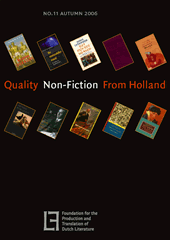Quality Non-Fiction from Holland 2006
Quality Non-Fiction from Holland 2006 is out, with a new layout and featuring ten remarkable new titles. The selection opens with bestselling author Midas Dekkers, known for books such as Dearest Pet, which was a huge success not only in Dutch but in English and German translation. In Physical Exercise, recently published with a first print run of 30,000 copies, the biologist takes on the contemporary cult of fitness in his famously satirical and provocative manner.
In an equally original manner, geologist Salomon Kroonenberg tackles the fashionable alarmist forecasts that suggest the earth is heading for man-made catastrophe. In his successful The Human Scale (more than 10,000 copies have already been sold) Kroonenberg challenges politicians, scientists and other opinion makers to extend their models of the future to at least the year 10,000 and to measure events not only against a human scale but against that of the natural world.
A recent bestseller is Hello Everybody! Images of the Middle East by journalist Joris Luyendijk, with 40,000 copies sold since June of this year. During the five years he spent as a correspondent in the Middle East for de Volkskrant and NRC Handelsblad, Luyendijk discovered that the prevailing image of journalism (suggesting journalists know what is going on and report it objectively) is misleading. He insists journalists should be more open about the fact that they cannot live up to their promises of truth and objectivity.
Journalist Betsy Udink has written a bestseller as well with Allah and Eva (17,000 copies sold), despite the painful and shocking nature of her subject. The book describes the terrible circumstances in which women in Pakistan are forced to live. Udink is a skilled writer, who employs seriousness and humour, repressed anger and cool analysis by turns.
Dutch historian Dik van der Meulen and Mexican sociologist Marta Durán de Huerta joined forces to write Mayans Ancient and Modern. They present an unusual approach to Mayan culture, which draws so many tourists every year, by continually weaving together past and present. The authors discover it is still possible to travel into the primeval forest in the nineteenth-century manner, using mules, and to find almost completely unknown temple complexes.
Smoke Signals is a unique book about native peoples by journalist Ineke Holtwijk. Holtwijk was a correspondent in Latin American for over fifteen years, working for de Volkskrant and for Dutch national television. Ten years ago she heard for the first time about a previously unknown tribe of Indians that had come into contact with modern society. Her story of the fascinating first encounter with what is in fact our own primitive past is perhaps the last eye-witness report by an outsider of what happens after first contact, bearing comparison with Tristes Tropiques by Claude Lévi-Strauss.
Johan Huizinga, author of The Waning of the Middle Ages, is the most important historian The Netherlands has ever produced, famous above all for his literary approach. In a no less beautifully written book, Order and Loyalty, historian Willem Otterspeer investigates in depth the importance of literary style in Huizinga’s work.
Historian Erik van Ree, who previously published several titles in English about Stalin, has written a comprehensive study of communism, World Revolution. The appeal of the book lies both in his all-encompassing approach and in the fact that it does not bear the stamp of Eurocentrism, since he pays a great deal of attention to countries in Asia, Latin American and Africa.
The publication of the collected works of the eighteenth-century Dutch philosopher Bernard Mandeville, who lived most of his life in England and wrote almost all his work in English, is a remarkable project. In this first volume, The World is Being Ruined by Virtue, translator Arne Jansen presents the famous Fable of the Bees and A Modest Defense of Publick Stews, which won Mandeville his nickname Man-Devil. To Jansen, Mandeville is a practitioner of cultural studies ‘avant la lettre’ who focuses on the possibilities and limitations of science and reason. As a psychiatrist he was above all a great expert on human nature.
Rounding off this year’s ten non-fiction titles is a perhaps even more ambitious project: the first complete edition of the letters of Vincent van Gogh. The Van Gogh Museum in Amsterdam has already spent more than ten years working on this project, which will be completed at the end of next year. Practically all existing translations are based on the unreliable four-volume edition of 1952-54. In addition to a recently discovered letter and several previously unpublished passages, this new edition presents a parallel translation in English, as well as notes relating to every issue on which contemporary readers might require clarification. All future editions and translations will be based on this definitive standard edition.
by Maarten Valken
Information
More information about these books can be found here.
During the upcoming Frankfurt Book Fair the brochure Quality Non-Fiction from Holland will be available at stand 6.0 C973, where non-fiction manager Maarten Valken will be happy to give you more information about these and other non-fiction titles.
Published: August 30, 2006 features | news | non-fiction

